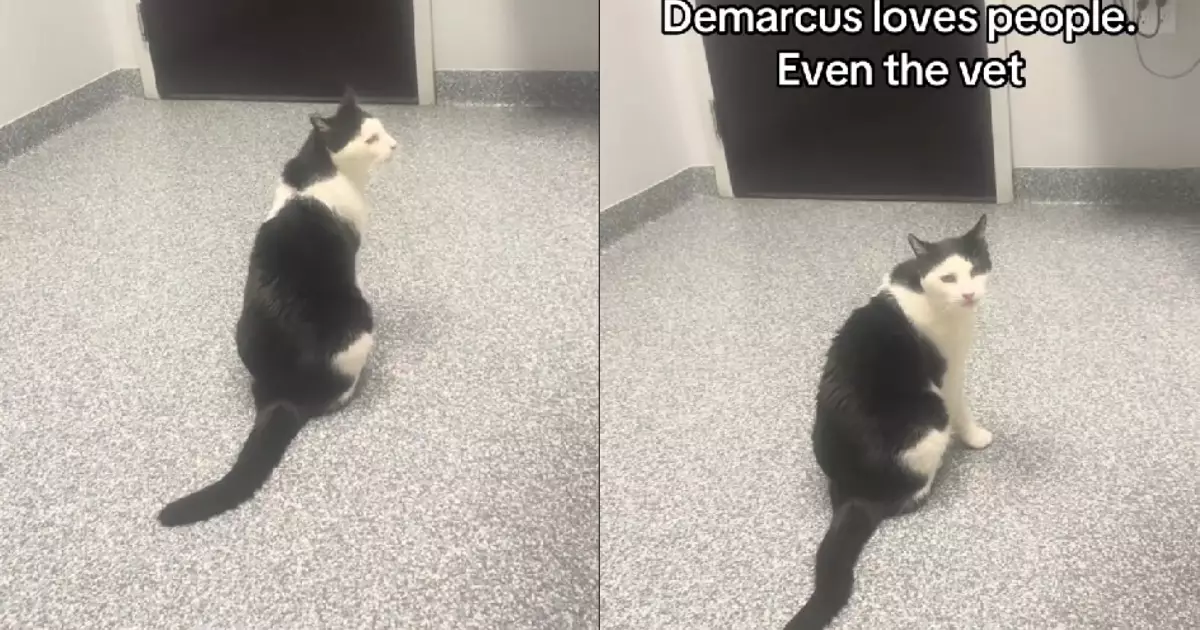Veterinary appointments are notoriously dreaded—not just by pets, but by their owners too. The familiar scenario is one of anxious pacing, plaintive meows or nervous whines, reluctant carriers, and sometimes frantic escape attempts. Humans understand the unease because they often mirror their own discomfort with doctor visits. Yet, tucked within this landscape of anxiety is a remarkable exception named Demarcus, a black-and-white cat who not only tolerates vet visits—he genuinely looks forward to them. This singular behavior challenges our usual assumptions about animal stress and introduces a new perspective on pet care and social interaction.
Demarcus does not behave like the typical patient. While most animals see a veterinary clinic as a place of pokes, prods, and unpleasant procedures, Demarcus views it as a social hub—a place brimming with familiar faces and gentle affection. Instead of freezing or fleeing, he approaches the staff with visible excitement, welcoming attention and companionship. Videos capturing his enthusiasm have gone viral, enchanting viewers and veterinary workers alike. The vet techs even compete to care for him, speaking of him fondly and sharing stories that suggest Demarcus is more than just an unusual patient—he’s a beloved community member. His reception is proof of how meaningful positive social connections are to animals, even in clinical settings.
The Unexpected Benefits of Social Butterflies in Pets
Demarcus’s behavior illuminates an intriguing facet of animal temperament: social affinity can transform typically stressful experiences into enjoyment. His story has sparked a wave of responses from other pet owners who have observed similar patterns in their animals. From loudly purring cats to wagging-tailed dogs that greet their vets like old friends, it turns out a subset of animals actually thrive during vet visits. These social butterflies appear to prioritize interaction and affection over fear or discomfort, suggesting that an animal’s personality plays a pivotal role in how it perceives and experiences medical care.
This revelation holds significance beyond mere curiosity. If veterinarians and pet owners acknowledge and nurture these social tendencies, vet visits could become less traumatic and more enriching for many animals. Clinics might develop new protocols centered on relationship-building and positive reinforcement rather than mere procedures. This could lessen the chronic anxiety that plagues so many pets, ultimately improving their health outcomes and the human-animal bond. Demarcus, therefore, becomes more than an anomaly; he’s a model demonstrating how empathy and social connection can reshape animal welfare.
Rethinking Veterinary Spaces as Social Arenas
The image of a sterile, intimidating vet office is so ingrained that it’s difficult to imagine transforming it into a joyful environment. Yet, Demarcus’s behavior nudges us toward reimagining these spaces as potential arenas of comfort and camaraderie. For animals like him, the clinic is akin to a club where they are recognized and cherished rather than threatened. This concept invites veterinary professionals to balance their clinical duties with fostering warmth and rapport, and encourages pet owners to perceive checkups not as dreaded obligations, but as opportunities for positive social experience.
Moreover, such transformations could appeal to a broader concept of animal psychology and behavior. Encouraging pets to associate visits with pleasant interactions and affection might reduce the high levels of stress and fear currently observed. As one vet receptionist noted, they “fight over who gets to be the tech” for Demarcus, indicative of the mutual joy these encounters can generate. Whether through grooming, play, or calming strokes, clinics can actively cultivate more moments that pets eagerly anticipate—shifting the narrative away from fear and toward friendship.
Why We Should Celebrate the Exception, Not Just the Rule
While it may be tempting to focus solely on how most pets dislike vet visits, Demarcus stands as a brilliant counterpoint, reminding us of the diversity in animal personalities and experiences. It takes courage and an open mind to recognize that pets are not a monolith shaped only by fear or caution; some genuinely seek connection and joy, even in the most unlikely places. Admiring Demarcus’s rare approach enriches our understanding of animal emotion and prompts a reassessment of how we care for our furry companions.
The broader implication is clear: embracing the variety of pet temperaments, particularly those that challenge expectations, holds power to enhance animal well-being. Whether these social explorers inspire new ways to approach veterinary care or simply bring smiles to those who witness their joy, their stories matter. They hint at a future where vet visits could be less about dread and more about delight, where empathy drives innovation in how we nurture our pets’ health and happiness.

